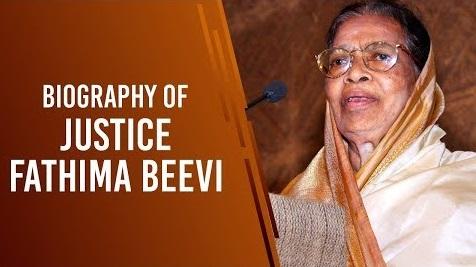Table of Contents
EARLY LIFE
- Fathima Beevi was born on 30 April 1927 at Pathanamthitta, Travancore, Kerala, as the daughter of Annaveetil Meera Sahib and Khadeja Bibi.
- She did her schooling in Catholicate High School, Pathanamthitta and got her B.Sc. from University College, Thiruvananthapuram. She obtained her B.L. from Government Law College, Thiruvananthapuram.
JUDGE
- In 1950, Fathima became the first woman to top the Bar Council of India’s exam. The same year in November, she enrolled as an advocate and started her career in Kerala’s lower judiciary.
- Over the next three decades, Fathima served as the Munsiff in the Kerala Subordinate Judicial Services, the Chief Judicial Magistrate, the District & Sessions Judge and a Judicial Member of the Income Tax Appellate Tribunal, before being elevated to the Kerala High Court as a judge in 1983.
FIRST WOMAN JUDGE OF SUPREME COURT
- She became permanent Judge of the High Court on 14 May 1984. She retired as the Judge of the High Court on 29 April 1989 but was further elevated to the Supreme Court as a Judge on 6 October 1989 where she retired on 29 April 1992.
- For India, it was a watershed moment that paved the way for women in India to occupy positions in the higher judiciary.
GOVERNOR
- The first Muslim woman Judge to be appointed to any Higher Judiciary, she also earned the distinction of being the first woman Judge of a Supreme Court of an Asian nation.
- After retiring in 1992, Beevi served as a member of the National Human Rights Commission. In 1997, she was appointed as the Governor of Tamil Nadu, an eventful stint that ended in in 2001.
LATER
- She received Hon. D Litt and Mahila Shiromani Award in 1990.She was also awarded Bharat Jyoti Award.
- After retiring from service in 1992, Beevi served as a member of the National Human Rights Commission.
- Since Beevi’s appointment in 1989, only five more women judges have been appointed to India’s apex court.






















 WhatsApp
WhatsApp